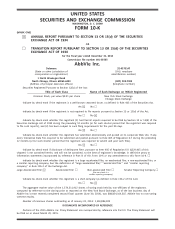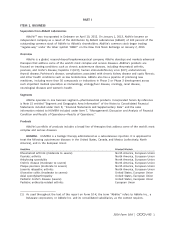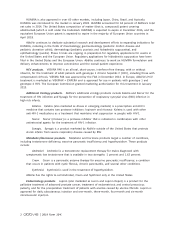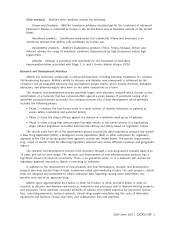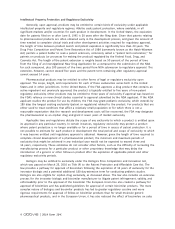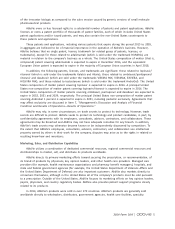AbbVie 2014 Annual Report Download - page 15
Download and view the complete annual report
Please find page 15 of the 2014 AbbVie annual report below. You can navigate through the pages in the report by either clicking on the pages listed below, or by using the keyword search tool below to find specific information within the annual report.
13NOV201221352027
approval. For example, AbbVie may submit marketing authorizations in the European Union under either a
centralized or decentralized procedure. The centralized procedure is mandatory for the approval of
biotechnology products and many pharmaceutical products and provides for a single marketing
authorization that is valid for all European Union member states. Under the centralized procedure, a single
marketing authorization application is submitted to the European Medicines Agency. After the agency
evaluates the application, it makes a recommendation to the European Commission, which then makes the
final determination on whether to approve the application. The decentralized procedure provides for mutual
recognition of national approval decisions and is available for products that are not subject to the
centralized procedure.
In Japan, applications for approval of a new product are made through the Pharmaceutical and
Medical Devices Agency (PMDA). Bridging studies to demonstrate that the foreign clinical data applies to
Japanese patients may be required. After completing a comprehensive review, the PMDA reports to the
Ministry of Health, Labour and Welfare, which then approves or denies the application.
The regulatory process in many emerging markets continues to evolve. Many emerging markets,
including those in Asia, generally require regulatory approval to have been obtained in a large developed
market (such as the United States) before the country will begin or complete its regulatory review process.
Some countries also require that local clinical studies be conducted in order to obtain regulatory approval
in the country.
The requirements governing the conduct of clinical trials and product licensing also vary. In addition,
post-approval regulatory obligations such as adverse event reporting and cGMP compliance generally apply
and may vary by country. For example, after a marketing authorization has been granted in the European
Union, periodic safety reports must be submitted and other pharmacovigilance measures must be
implemented.
Regulation—Commercialization, Distribution, and Manufacturing
The manufacture, marketing, sale, promotion, and distribution of AbbVie’s products are subject to
comprehensive government regulation. Government regulation by various national, regional, federal, state,
and local agencies, both in the United States and other countries, addresses (among other matters)
inspection of, and controls over, research and laboratory procedures, clinical investigations, product
approvals and manufacturing, labeling, packaging, marketing and promotion, pricing and reimbursement,
sampling, distribution, quality control, post-marketing surveillance, record keeping, storage, and disposal
practices. AbbVie’s operations are also affected by trade regulations in many countries that limit the import
of raw materials and finished products and by laws and regulations that seek to prevent corruption and
bribery in the marketplace (including the United States Foreign Corrupt Practices Act and the United
Kingdom Bribery Act, which provide guidance on corporate interactions with government officials) and
require safeguards for the protection of personal data. In addition, AbbVie is subject to laws and
regulations pertaining to health care fraud and abuse, including state and federal anti-kickback and false
claims laws in the United States. Prescription drug manufacturers such as AbbVie are also subject to taxes,
as well as application, product, user, establishment, and other fees.
Compliance with these laws and regulations is costly and materially affects AbbVie’s business. Among
other effects, health care regulations substantially increase the time, difficulty, and costs incurred in
obtaining and maintaining approval to market newly developed and existing products. AbbVie expects
compliance with these regulations to continue to require significant technical expertise and capital
investment to ensure compliance. Failure to comply can delay the release of a new product or result in
regulatory and enforcement actions, the seizure or recall of a product, the suspension or revocation of the
authority necessary for a product’s production and sale, and other civil or criminal sanctions, including fines
and penalties.
2014 Form 10-K 9


